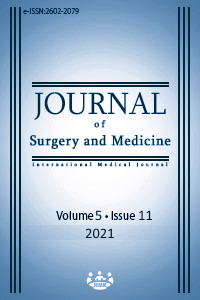Emergency peripartum hysterectomy: Five-year experience in a university hospital
Keywords:
Emergency peripartum hysterectomy, Placenta previa, Abnormal placentation, Uterine atony, Obstetric hemorrhageAbstract
Background/Aim: Postpartum hemorrhage (PPH) is an important cause of maternal death and morbidity worldwide. Its incidence is still increasing in some countries. This study aimed to evaluate the incidence, indications, risk factors, complications, maternal and fetal outcomes, mortality rates and management strategies of emergency peripartum hysterectomy (EPH) in women with life-threatening postpartum hemorrhage. Methods: This retrospective cohort study included 94 cases of EPH performed at tertiary obstetric center between January 2016-January 2021. The demographic data, current pregnancy and delivery mode, hysterectomy indications, operative complications, postoperative conditions, and maternal and fetal outcomes were analyzed. EPH was performed for hemorrhage which cannot be controlled with other conventional treatments within 24 hours of delivery. Results: The incidence of EPH was 1.71 per 1000 deliveries. In our study, the indications of hysterectomy were placenta previa in 47 cases (50%), placental insertion anomalies in 23 cases (24.5%), uterine atony in 22 cases (23.4%), and uterine rupture in 2 cases (2.1%). Hysterectomy was performed after vaginal delivery in 7 patients (7.4%) and during cesarean section in 87 cases (92.6%). Total and subtotal hysterectomy were performed in 88 (93.6%) and 6 cases (6.4%), respectively. Major complications occurred in 40 patients (42.6%). In total, 97.9% of the patients required a transfusion of blood and blood products. The mean postoperative hospital stay was 8.1 (6.1) days. There were two (2.2 %) maternal deaths due to pulmonary embolism and coagulopathy. Conclusion: EPH operation has high maternal morbidity and mortality but is lifesaving when performed at the appropriate time. The most common indication for EPH was placental abnormality (74.5%), followed by uterine atony (23.4%). Together with a significant increase in cesarean rates, significant increases in the frequency of placental abnormalities are remarkable. Limiting the number of cesarean deliveries will have a significant impact on reducing the risk of EPH.
Downloads
References
Sturdee DW, Rushton DI. Caesarean and post‐partum hysterectomy 1968–1983. BJOG: An International Journal of Obstetrics & Gynaecology. 1986;93:270–4.
Engelsen IB, Albrechtsen S, Iversen OE. Peripartum hysterectomy-incidence and maternal morbidity. Acta obstetricia et gynecologica Scandinavica. 2001;80:409–12.
Zeteroglu S, Ustun Y, Engin-Ustun Y, Sahin G, Kamacı M. Peripartum hysterectomy in a teaching hospital in the eastern region of Turkey. European Journal of Obstetrics & Gynecology and Reproductive Biology. 2005;120:57–62.
Van Den Akker T, Brobbel C, Dekkers OM, Bloemenkamp KWM. Prevalence, indications, risk indicators, and outcomes of emergency peripartum hysterectomy worldwide. Obstetrics & Gynecology. 2016;128:1281–94.
Campbell SM, Corcoran P, Manning E, Greene RA, Group IMMA. Peripartum hysterectomy incidence, risk factors and clinical characteristics in Ireland. European Journal of Obstetrics & Gynecology and Reproductive Biology. 2016;207:56–61.
Kallianidis AF, Maraschini A, Danis J, Colmorn LB, Deneux‐Tharaux C, Donati S, et al. Epidemiological analysis of peripartum hysterectomy across nine European countries. Acta obstetricia et gynecologica Scandinavica. 2020;99:1364–73.
Cara Z, Thompson EL, O’Rourke K, Nembhard WN. Cesarean section and the risk of emergency peripartum hysterectomy in high-income countries: a systematic review. Archives of gynecology and obstetrics. 2015;292:1201–15.
Machado LSM. Emergency peripartum hysterectomy: incidence, indications, risk factors and outcome. North American journal of medical sciences. 2011;3:358.
Akar ME, Yilmaz ES, Yuksel B, Yilmaz Z. Emergency peripartum hysterectomy. European Journal of Obstetrics & Gynecology and Reproductive Biology. 2004;113:178–81.
Yucel O, Ozdemir I, Yucel N, Somunkiran A. Emergency peripartum hysterectomy: a 9-year review. Archives of gynecology and obstetrics. 2006;274:84–7.
Flood KM, Said S, Geary M, Robson M, Fitzpatrick C, Malone FD. Changing trends in peripartum hysterectomy over the last 4 decades. American journal of obstetrics and gynecology. 2009;200:632-e1.
Knight M, Kurinczuk JJ, Spark P, Brocklehurst P. Cesarean delivery and peripartum hysterectomy. Obstetrics & Gynecology. 2008;111:97–105.
Zorlu CG, Turan C, Işik A, Danişman N, Mungan T, Gökmen O. Emergency hysterectomy in modern obstetric practice changing clinical perspective in time. Acta obstetricia et gynecologica Scandinavica. 1998;77:186–90.
Clark SL, Yeh SY, Phelan JP, Bruce S, Paul RH. Emergency hysterectomy for obstetric hemorrhage. Obstetrics and gynecology. 1984;64:376–80.
Kayabasoglu F, Guzin K, Aydogdu S, Sezginsoy S, Turkgeldi L, Gunduz G. Emergency peripartum hysterectomy in a tertiary Istanbul hospital. Archives of gynecology and obstetrics. 2008;278:251–6.
Karayalçın R, Özcan S, Özyer Ş, Mollamahmutoğlu L, Danışman N. Emergency peripartum hysterectomy. Archives of gynecology and obstetrics. 2011;283:723–7.
Kwee A, Bots ML, Visser GHA, Bruinse HW. Emergency peripartum hysterectomy: a prospective study in The Netherlands. European Journal of Obstetrics & Gynecology and Reproductive Biology. 2006;124:187–92.
Oyelese Y, Smulian JC. Placenta previa, placenta accreta, and vasa previa. Obstetrics & Gynecology. 2006;107:927–41.
Hamilton BE, Martin JA, Ventura SJ. Births: preliminary data for Natl Vital Stat Rep. 2007. 2006.
NHS Maternity Statistics - England, 2004-2005. NHS Maternity Statistics. 2005. https://files.digital.nhs.uk/publicationimport/pub01xxx/pub01674/nhs-mater-eng-2004-2005-rep.pdf.
Lone F, Sultan AH, Thakar R, Beggs A. Risk factors and management patterns for emergency obstetric hysterectomy over 2 decades. International Journal of Gynecology & Obstetrics. 2010;109:12–5.
Baskett TF. Emergency obstetric hysterectomy. Journal of Obstetrics and Gynaecology. 2003;23:353–5.
Bakshi S, Meyer BA. Indications for and outcomes of emergency peripartum hysterectomy. A five-year review. The Journal of reproductive medicine. 2000;45:733–7.
Selo-Ojeme DO, Bhattacharjee P, Izuwa-Njoku NF, Kadir RA. Emergency peripartum hysterectomy in a tertiary London hospital. Archives of Gynecology and Obstetrics. 2005;271:154–9.
El-Jallad MF, Zayed F, Al-Rimawi HS. Emergency peripartum hysterectomy in Northern Jordan: indications and obstetric outcome (an 8-year review). Archives of gynecology and obstetrics. 2004;270:271–3.
Habek D, Bečareviç R. Emergency peripartum hysterectomy in a tertiary obstetric center: 8-year evaluation. Fetal diagnosis and therapy. 2007;22:139–42.
Huque S, Roberts I, Fawole B, Chaudhri R, Arulkumaran S, Shakur-Still H. Risk factors for peripartum hysterectomy among women with postpartum haemorrhage: analysis of data from the WOMAN trial. BMC pregnancy and childbirth. 2018;18:1–8.
Say L, Chou D, Gemmill A, Tunçalp Ö, Moller A-B, Daniels J, et al. Global causes of maternal death: a WHO systematic analysis. The Lancet global health. 2014;2:e323–33.
Downloads
- 603 593
Published
Issue
Section
How to Cite
License
Copyright (c) 2021 Feyza Bayram, Canan Urun, Jale Karakaya, Süleyman Serkan Karaşin
This work is licensed under a Creative Commons Attribution-NonCommercial-NoDerivatives 4.0 International License.
















